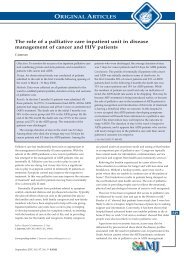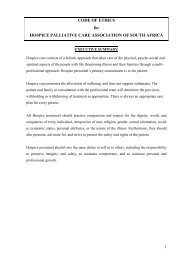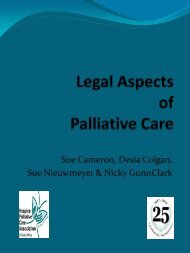Dying and The Law - Hospice Palliative Care Association of South ...
Dying and The Law - Hospice Palliative Care Association of South ...
Dying and The Law - Hospice Palliative Care Association of South ...
Create successful ePaper yourself
Turn your PDF publications into a flip-book with our unique Google optimized e-Paper software.
CUSTOMARY LAW OF INHERITANCEIntestate succession in terms <strong>of</strong> AfricanCustomary <strong>Law</strong> is based on the principle<strong>of</strong> primogeniture. What primogenituremeans is that:Only a male, who is related to thedeceased through the male-line, isentitled to inherit.An example <strong>of</strong> this is where the eldestson <strong>of</strong> the senior wife or his descendant,if he is dead, usually takes over as thehead <strong>of</strong> the house when the head <strong>of</strong> thehouse dies. In this way, the formalcustomary law <strong>of</strong> succession discriminatesagainst women <strong>and</strong> children by excludingthem from their rightful inheritance.Often what happened was that, after thedeath <strong>of</strong> the adult male, the widow <strong>and</strong>the children were thrown out <strong>of</strong> thefamily home <strong>and</strong> the widow had verylittle legal protection.In response to the unfairness that wasthe result <strong>of</strong> certain discriminatorysituations, changes have recently takenplace that directly impact on thecustomary law <strong>of</strong> inheritance <strong>and</strong> therights <strong>of</strong> women <strong>and</strong> children.In the Constitutional Court decision <strong>of</strong>Bhe <strong>and</strong> Others v Magistrate Khayelitsha<strong>and</strong> Others 2005 (1) SA 580, a ruling wasmade that certain laws, dealing with theadministration <strong>of</strong> black estates, wereunconstitutional because theydiscriminate against women. This decisionhas had a far reaching impact on the futureadministration <strong>of</strong> black estates, <strong>and</strong> newlaws have been developed <strong>and</strong> debated.In <strong>South</strong> Africa a new Act has beenrecently passed <strong>and</strong> is called the Reform<strong>of</strong> Customary <strong>Law</strong> <strong>of</strong> Succession <strong>and</strong>Regulation <strong>of</strong> Related Matters Act 2009.NotesA will written by the adult malebefore he dies protects his wife <strong>and</strong>children from such a practice. Seepage 183 <strong>and</strong> the example <strong>of</strong> aSimple Will on page 184 for guidanceon drawing up a will.Case StudyBhe <strong>and</strong> Others v MagistrateKhayelitsha <strong>and</strong> Others 2005<strong>The</strong> Bhe case concerned two younggirls, aged 9 <strong>and</strong> 2. <strong>The</strong> customary rule<strong>of</strong> primogenture that prevented themfrom inheriting their father’s property,because <strong>of</strong> their female gender, waschallenged on their behalf.<strong>The</strong> girls had been living in Khayelitshawith their parents until their father’sdeath. Even though the parents hadbeen together for twelve years, theparents were not legally married. Aftertheir father had died, the familycontinued to live on the property untiltheir gr<strong>and</strong>father told them to leave.<strong>The</strong> gr<strong>and</strong>father claimed that underAfrican customary law, the houseshould now be the property <strong>of</strong> theeldest male relative <strong>of</strong> the father’schildren. This meant that, in terms <strong>of</strong>the rule <strong>of</strong> primogeniture, the familyhouse would become his property <strong>and</strong>he then planned to sell it.<strong>The</strong> court decided in favour <strong>of</strong> the girls<strong>and</strong> against the gr<strong>and</strong>father since thiswas a clear case <strong>of</strong> African femalesbeing discriminated against. <strong>The</strong> twogirls were declared to be the sole heirs<strong>of</strong> their father’s estate <strong>and</strong> were giventhe right to inherit equally.Topicfor discussionWhat do you think <strong>of</strong> theoutcome <strong>of</strong> this case?<strong>The</strong> Court decided that certainlaws, dealing with theadministration <strong>of</strong> black estates,were unconstitutional becausethey discriminate againstwomen. This decision has hada far reaching impact on thefuture administration <strong>of</strong> blackestates, <strong>and</strong> new laws havebeen developed <strong>and</strong> debated.In <strong>South</strong> Africa a new Act hasbeen recently passed <strong>and</strong> iscalled the Reform <strong>of</strong>Customary <strong>Law</strong> <strong>of</strong> Succession<strong>and</strong> Regulation <strong>of</strong> RelatedMatters Act 2009.Chapter 12 | <strong>Dying</strong> <strong>and</strong> <strong>The</strong> <strong>Law</strong>187










